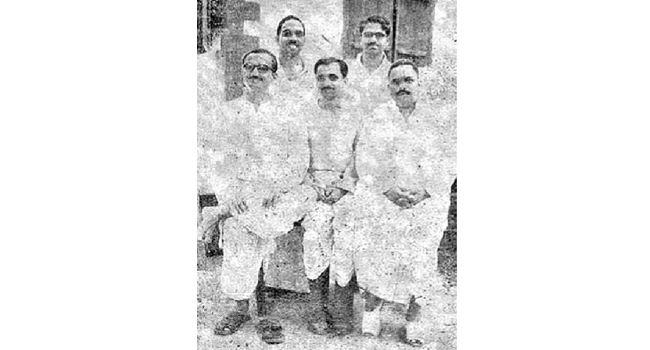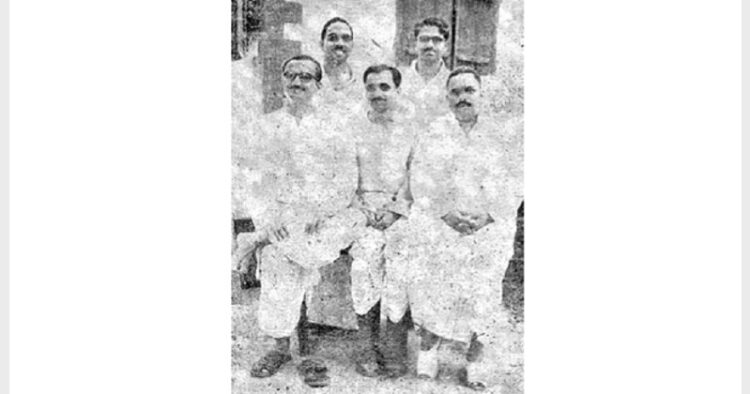
Parameshwarji with Jana Sangh team of Thengadiji,
Deendayalji, Jagannath Rao Joshi and Bharathan in 1958
Deendayalji, Jagannath Rao Joshi and Bharathan in 1958
Parameswaranji’s book on Kerala’s Hindu renaissance is like a textbook for all those who want to learn about the recent cultural history
Nothing in Sangh movement may be so unbearable recently than the demise of P. Parameshwar ji. Parameshwarji had his life journey through many of the facets of national life. He had a brilliant academic career, was an RSS Pracharak throughout his life, was editor of journals, had a long political association with Jana Sangh, had led many intellectual institutions, had spearheaded Hindu renaissance movement in Kerala, he was the veteran ideologue of RSS and had many such credits in his life.
Parameshwar ji had brilliant student life in Thiruvananthapuram where he passed BA honours with a gold medal. At that time he got associated with RSS and became an active worker. When Guruji visited Thiruvananthapuram in 1948, he was in charge of a Sanghik, which was attacked by the Communists. Parameshwarji held satyagraha in 1949 against the ban on RSS and was in jail for some time. After his studies, he decided to dedicate his whole life as a Sangh Pracharak from 1950. As a Pracharak of RSS, he played a significant role in expanding RSS work in various parts of Kerala. His intellectual orientation was nourished with his long association with towering ideologues like Shri Guruji Golwalkar, Shri Deendayal Upadhyaya and Shri Dattopant Thengadi. He authored nearly 20 books out of which two books will be remembered forever in the mainstream literature. First one is ‘Sri Narayana Guru: The Prophet of Renaissance’ which describes how Sri Narayana Guru as a Hindu Sanyasi was instrumental in changing the Hindu narratives in Kerala. It is available in English also. The second one is ‘Aurobindo: The Philosopher of the Future’ which introduces Maharshi Aurobindo and his profound philosophy in a simple and forceful language, which any ordinary one can grasp.
In 1958, after the formation of Kerala state, Parameshwarji was appointed as state organising secretary of Bharatiya Jana Sangh. After that, he rose to the level of national vice president of BJS and was well known as its national leader. Throughout the Emergency period, he was in jail. After that, he left politics and was heading Deendayal Research Institute in Delhi. As a director of the Institute, he could give an ideological impetus to the Sangh movement.
During the 1980s when he shifted his area of activity to Kerala, the atmosphere was ripe for playing a prominent role. That was a time when communist-atheist thoughts monopolised Kerala’s entire intellectual field. Ideologues like EMS Namboodiripad reigned unchallenged. Keralites felt that to become progressive, one has to become a communist. Claiming to be a Hindu was regressive and old fashioned. Kerala’s walls were full of slogans like ‘what we need is factories and not temples’ etc. Parameshwarji’s arrival changed the narratives and slowly filled the space with pride in Hindutva and Nationalism. After that Kerala saw a mammoth Hindu renaissance taking shape under Sangh leadership. Slowly, Parameshwarji was accepted as an intellectual on a par with EMS Namboodiripad or even more than him. In 1983 the Vishal Hindu Sammelan under his vision created history. Entire Kerala Hindu society was seen fancied by its theme song “All Hindus are one”. All the Hindu caste-based organisations which were fighting with each other came together magically on one platform.
He also created a milestone by laying the foundation of Bharatiya Vichar Kendram, now a part of Prajna Pravah. It was inaugurated by the great Sangh ideologue Shri Dattopant Thengadi ji. It was an institutionalised effort to overpower the communist grip over the Malayali mind, in which it succeeded. Bharatiya Vichar Kendram provided him with a platform to create an intellectual fight to conquer Marxian forts. His series of speeches on comparative studies on ‘Bhagavad Gita and Marxism’, ‘Swami Vivekananda and Marx’ etc. were attended largely by even communist intellectuals. Not only that such efforts systematically shattered Marxist influence, they also resulted in attracting a large number of communists to shift to Sangh movement. He also raised slogans like ‘From Marx to Maharshi’ and ‘From Marxism to Human Philosophy’ which attracted youths. His book on Kerala’s Hindu renaissance is like a textbook for all those who want to learn about the recent cultural history. He was instrumental in spreading the message of Bhagavad Gita through the ‘Geeta Swadhyay Kendras’ founded by him. This was the major attempt to spread Bhagavad Gita after the Samadhi of Swami Chinmayananda. In his later years, the workers of ‘Vivekananda Kendra’ had the fortune to have his guidance as President of the organisation. Many important positions at national level came in search of him which were discarded by him like a Yogi with humility. When he was offered Rajya Sabha seat, he rejected the offer.
At present, no Marxist is daring to challenge Sangh movement on Hindu ideology; hence they are on the efforts to annihilate swayamsevaks physically. The influence of such a change was so patent that the former Chief Minister and veteran CPI leader C. Achuta Menon wrote in a Malayalam weekly that Indian culture is Hindu culture itself, which created a tempest of controversy. I had the fortune to accompany Parameshwarji when he visited Achuta Menon to congratulate him on his open and bold remark. Parameshwarji’s constant organisational tour and fruitful meeting with important personalities and intellectuals in social life were indeed marvellous learning for those who accompanied him. It is amazing to see how fast he had conquered their minds with his simplicity and class behaviour. He was a Guru, ideal, mentor, guide and everything for people like me in organisational life. He would open up to the magical windows of the intellectual world while staying in my house whenever he visited. His visionary guidance ranged from the supra-rational and higher mind of Aurobindo’s thought to the material world of labour relations.
Today, Kerala is supposed to be one of the last remnants of Communists; still, Communists in Kerala did not dare to celebrate the 200th year of Karl Marx, 100th year of October Revolution or 150th year of Das Capital, all of which coincided last year. Whereas the 100th year of Dr Hedgewar, Shri Guruji and 150th year of Swami Vivekananda were celebrated at every nook and corner of Kerala by the Nationalist guards. He could keep the high intellectual level in Sangh School of Thought next to Deendayalji and Thengadiji. The space created by his loss to Sangh movement is immense and difficult to be filled. Still, he has departed with his life mission fulfilled, hoping the rest of the activists to carry it forward. Let us pay tribute with thousand Pranams to the Guru who has inspired and led many through the wonderful world of Hindu vision.
(The writer is national president of Bharatiya Mazdoor Sangh)














Comments